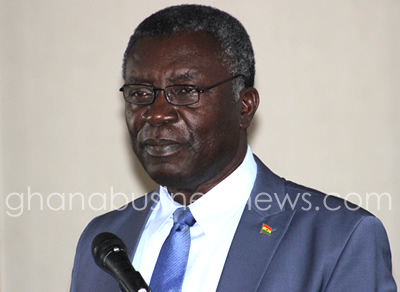Ghana is not industrialised to be polluted – Minister
 The Minister of Environment, Science, Technology and Innovation (MESTI) Professor Kwabena Frimpong-Boateng, has asked Ghanaians to help resolve environmental pollution before it gets out of hand.
The Minister of Environment, Science, Technology and Innovation (MESTI) Professor Kwabena Frimpong-Boateng, has asked Ghanaians to help resolve environmental pollution before it gets out of hand.
He explained that Ghana is not one of the heavily industrialised countries that should be engulfed by pollution and noted that every pollution is preventable.
Professor Frimpong-Boateng was giving a keynote address at a Health and Pollution Acton Plans (HPAP) Inception Workshop held in Accra.
It attracted research experts from MESTI, Crop and Science Research (CSR), Council for Scientific and Industrial Research (CSIR), Water Research Institute, Public Health-University of Ghana, Environmental Protection Agency, Friends of the Nation, an NGO, WHO-Ghana and other stakeholders from across the country.
Organised by the United Nations Industrial Development Organisation (UNIDO) in collaboration with the Global Alliance on Health and Pollution, the Ghanaian and Chinese governments it was on the theme “Mitigating the health impacts of toxic pollution”.
He was not happy that Ghanaians were dying from preventable things that were caused by them.
Professor Frimpong-Boateng called on scientists in the country to come out with pollutants that are exposed to protect the lives of Ghanaians from pollution-related diseases.
The Minister charged researchers to as a matter of urgency, form network and share their research topics, findings for contributions and support from government.
Research areas were not improved most of the time due to the fact that researchers had no idea what their colleagues were researching on and they sometimes end up duplicating topics, he intimated.
He noted that the Ghana Innovation Research and Commercialisation Unit, soon to be set-up by the Ministry would collate content such as information from all research centres, what the researchers are doing, the commercial value, the new product or factory that is coming up, the contribution to the GDP, employment creation and others.
Dr Francis Tettey of CSIR- Soil Research Institute in a presentation on Soil pollution: Heavy metals content and food quality in selected areas: said, the selected sites; Obuase (mining), Sekyere West (Agro-chemical) and Ejisu-Juaben in the Ashanti region were selected for mining activities, use of agro-chemicals and vehicular exhaust fumes, respectively.
He said, soils got polluted by agric-pollutants (use of pesticides, weedicides), heavy metals (pollutants from mining sector) and secondary metal products (melting metals).
Mr Tettey explained that the mining sector did not only pollute the air, water bodies but also the soil, adding that, that of the soil was hazardous to health as it affected food quality.
Dr Tettey mentioned some of the accompanied diseases as kidney, liver problems and cancer.
Source: GNA
